| Listing 1 - 10 of 161 | << page >> |
Sort by
|
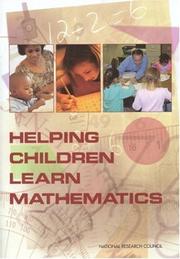
ISBN: 0309084318 9786610183746 1280183748 0309512638 9780309512633 9780309084314 0305084318 0309131987 9780309131988 9781280183744 6610183740 Year: 2002 Publisher: Washington, DC National Academy Press
Abstract | Keywords | Export | Availability | Bookmark
 Loading...
Loading...Choose an application
- Reference Manager
- EndNote
- RefWorks (Direct export to RefWorks)
Book
ISBN: 1281116181 9786611116187 0387712542 9781281116185 9780387712543 Year: 2008 Volume: 43 Publisher: New York, NY : Springer US : Imprint: Springer,
Abstract | Keywords | Export | Availability | Bookmark
 Loading...
Loading...Choose an application
- Reference Manager
- EndNote
- RefWorks (Direct export to RefWorks)
Given its abstract nature and the highly syntactical competence required by the use of symbolic algebra, research on its teaching and learning must rely on approaches that include semiotic concepts and analyses that recall the history of algebraic ideas, among others. Educational Algebra: A Theoretical and Empirical Approach deals with a theoretical perspective on the study of school algebra, in which both components (semiotics and history) occur. This perspective runs opposite to general theoretical models, since it submits components for the design of local frameworks for theoretical analysis. The Methodological design allows for the interpretation of specific phenomena and the inclusion, within such interpretative frameworks, of evidence not included in more general treatments. Such is the case of phenomena observed in subjects who are initiating the study of symbolic algebra, involving the production of personal sign systems at the intermediate level or the level previous to the mathematical sign system which is to be learned. Disciplines such as Linguistics, Logic, Psycholinguistics, Semiotics, general Cognitive Psychology, Mathematics Psychology, Mathematics Epistemology, History of Mathematics, and others have carried out research on the same topics approached by Mathematics Education and have redefined their results within the framework of their respective fields. Specifically, theorists in Linguistics, Information Processing and Didactics of Mathematics have done important work on the notion of code. Today, this notion is a key element to interpreting the idea of representation in the new explanatory models of cognitive problems placed by alternative teaching approaches, including those involving a technological environment. Additionally, Psycholinguistics and Artificial Intelligence in procedural models of human abilities have intended to explain how and why users of mathematical language naturally and commonly make mistakes in syntactical procedures. Educational Algebra: A Theoretical and Empirical Approach adds to previous developments with priority given to a pragmatic perspective on "meaning in use" over "formal meaning". The bulk of these approaches and others of similar nature have lead to a focus on competence rather than on a user’s activity with mathematical language. Such a shift in perspective has fundamental implications on the way mathematical language is studied. Essentially, Grammar—the abstract formal system—and Pragmatics—the principles of the use of language—are complementary domains in this volume. Both are related to different teaching models, whether new or traditional, used in helping students to become competent users of Algebra. Because of this, Educational Algebra: A Theoretical and Empirical Approach will be of interest to researchers and practitioners within the mathematics education field.
Algebra --- Mathematics --- Study and teaching. --- Mathematics. --- Algebra. --- Mathematics Education. --- Mathematical analysis --- Math --- Science --- Mathematics—Study and teaching .
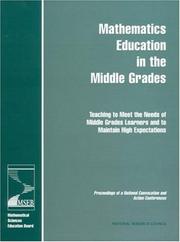
ISBN: 0309067979 0309516056 0585221421 9780585221427 9780309516051 0309086426 9780309086424 9780309067973 0309172276 Year: 2000 Publisher: Washington, DC National Academy Press
Abstract | Keywords | Export | Availability | Bookmark
 Loading...
Loading...Choose an application
- Reference Manager
- EndNote
- RefWorks (Direct export to RefWorks)
In September 1998, the Math Science Education Board National held a Convocation on Middle Grades Mathematics that was co-sponsored by the National Council of Teachers of Mathematics, the National Middle School Association, and the American Educational Research Association. The Convocation was structured to present the teaching of middle school mathematics from two points of view: teaching mathematics with a focus on the subject matter content or teaching mathematics with a focus on the whole child and whole curriculum. This book discusses the challenges before the nation's mathematical sciences community to focus its energy on the improvement of middle grades mathematics education and to begin an ongoing national dialogue on middle grades mathematics education.
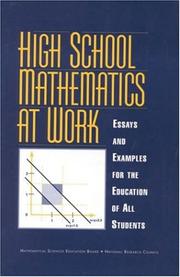
ISBN: 0309063531 0309521335 0585020124 9780585020129 9780309063531 0305063531 0309174732 9780309521338 Year: 1998 Publisher: Washington D.C. National Academy Press
Abstract | Keywords | Export | Availability | Bookmark
 Loading...
Loading...Choose an application
- Reference Manager
- EndNote
- RefWorks (Direct export to RefWorks)
Book
ISBN: 1283713454 019163736X 9780199661329 9780191637360 0199661324 9781283713450 0191637378 Year: 2013 Publisher: Oxford Oxford University Press
Abstract | Keywords | Export | Availability | Bookmark
 Loading...
Loading...Choose an application
- Reference Manager
- EndNote
- RefWorks (Direct export to RefWorks)
Every year, thousands of students go to university to study mathematics (single honours or combined with another subject). Many of these students are extremely intelligent and hardworking, but even the best will, at some point, struggle with the demands of making the transition to advanced mathematics. Some have difficulty adjusting to independent study and to learning from lectures. Other struggles, however, are more fundamental: the mathematics shifts in focus from calculation toproof, so students are expected to interact with it in different ways. These changes need not be mysterious - math
Mathematics --- Mathematics as a profession --- Math --- Science --- Study and teaching (Higher) --- Vocational guidance. --- Mathematics - Study and teaching (Higher)
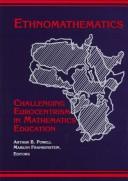
ISBN: 1438416415 0585075697 9780585075693 9780791433515 079143351X 9780791433522 0791433528 079143351X 0791433528 9781438416410 Year: 1997 Publisher: Albany, N.Y. State University of New York Press
Abstract | Keywords | Export | Availability | Bookmark
 Loading...
Loading...Choose an application
- Reference Manager
- EndNote
- RefWorks (Direct export to RefWorks)
Ethnomathematics. --- Eurocentrism. --- Mathematics -- Study and teaching. --- Mathematics --- Eurocentricity --- Ethnocentrism --- Ethno-mathematics --- Indigenous peoples --- Mathematics, Primitive --- Ethnology --- Study and teaching.
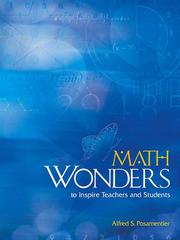
ISBN: 9786610931118 1280931116 1416601066 9780871208520 0871208520 9780871208521 9781416601067 9781280931116 9780871208859 0871208857 0871207753 0871208857 Year: 2003 Publisher: Alexandria, Va. Association for Supervision and Curriculum Development
Abstract | Keywords | Export | Availability | Bookmark
 Loading...
Loading...Choose an application
- Reference Manager
- EndNote
- RefWorks (Direct export to RefWorks)
A veteran teacher provides examples of the beauty and wonder of numbers and mathematics that are guaranteed to get student sand teachers more interested in math.
Book
ISBN: 9780128125755 0128125756 9780128125748 0128125748 Year: 2018 Publisher: Cambridge, Massachusetts : Elsevier,
Abstract | Keywords | Export | Availability | Bookmark
 Loading...
Loading...Choose an application
- Reference Manager
- EndNote
- RefWorks (Direct export to RefWorks)
Language and Culture in Mathematical Cognition, Fourth Edition focuses on the role of linguistic and cultural factors in math cognition and development. It covers a wide range of topics, including analogical mapping in numerical development, arithmetic fact retrieval in the bilingual brain, cross-cultural comparisons of mathematics achievement, the shaping of numerical processing by number word construction, the influence of Head Start programs, the mathematical skills of children with specific language impairments, the role of culture and language in creating associations between number and space, and electrophysiological studies of linguistic traces in core knowledge at the neural level. Includes cutting-edge findings, innovative measures, recent methodological advances and groundbreaking theoretical developments -- Synthesizes research from various subdomains of math cognition research -- Covers the full complement of research in mathematical thinking and learning -- Informs researchers, scholars, educators, students and policymakers . --
Mathematics --- Study and teaching (Elementary) --- Psychological aspects. --- Math --- Science --- Mathematics - Study and teaching --- Language and education --- Mathematical ability --- Psychological aspects
Book
ISBN: 1441905960 1441905987 9786612826986 1489983732 1282826980 1441905979 9781489983732 9781282826984 9781441905970 Year: 2009 Publisher: New York, NY : Springer US : Imprint: Springer,
Abstract | Keywords | Export | Availability | Bookmark
 Loading...
Loading...Choose an application
- Reference Manager
- EndNote
- RefWorks (Direct export to RefWorks)
We know the process by which children become social, moral, and creative beings, but when—and how—do they become mathematical beings? This thought-provoking volume follows ten children (ages seven through eighteen) in schools in New Zealand, England, Australia, Sweden, and an international school in Switzerland as they come to recognize the mathematical as part of their lives, their academic identities, and their identities as human beings. Through these students’ experiences important themes emerge, including mathematics as work, a domain of learning, and an avenue for competition; mathematical ability as a key to how they are perceived by others; and the relationships between mathematics achievement and the larger social and academic picture. This comparative study of educational systems and academic development will inform readers in these and other salient areas: Theoretical bases for understanding children as mathematical subjects. Help in creating the mathematical self: tutoring and related programs. The roles of compulsory study and standardized assessment. Class and ethnic content in children’s math narratives. The gendering of mathematical ability and activity. What children’s math experience can teach us about teaching the subject. Children Talk about Their Mathematics Lives opens bold windows onto how young people learn and how disparities arise, making it a cutting-edge resource for researchers and libraries, graduates and teachers in mathematics education and early childhood education.
Early childhood education. --- Education. --- Mathematics. --- Mathematics -- Social aspects. --- Mathematics -- Study and teaching (Elementary). --- Mathematics -- Study and teaching (Secondary). --- Mathematics --- Mathematics Teaching & Research --- Education, Special Topics --- Education --- Social Sciences --- Physical Sciences & Mathematics --- Study and teaching --- Social aspects --- Study and teaching. --- Social aspects. --- Math --- Child development. --- Mathematics Education. --- Childhood Education. --- Science --- Early Childhood Education. --- Mathematics—Study and teaching . --- Child study --- Children --- Development, Child --- Developmental biology --- Development
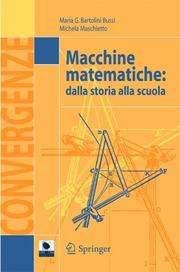
ISBN: 1281350273 9786611350277 8847004039 8847004020 Year: 2006 Volume: v. 1 Publisher: Milano : Springer,
Abstract | Keywords | Export | Availability | Bookmark
 Loading...
Loading...Choose an application
- Reference Manager
- EndNote
- RefWorks (Direct export to RefWorks)
Che cosa sono le macchine matematiche? Una macchina matematica (in un contesto geometrico) è uno strumento che ha uno scopo fondamentale (indipendentemente dall’uso che poi se ne farà): obbligare un punto, o un segmento, o una figura qualsiasi (sostenuti da un opportuno supporto materiale che li renda visibili) a muoversi nello spazio o a subire trasformazioni seguendo con esattezza una legge astrattamente, matematicamente determinata. Le macchine matematiche sono tra gli strumenti suggeriti per l’attività di laboratorio, nella proposta di nuovi curricoli avanzata dall’Unione Matematica Italiana. Una ampia collezione di macchine (oltre 200), di interesse storico e didattico, è stata ricostruita a Modena, dove è collocato, presso il Dipartimento di Matematica, un laboratorio di ricerca per la didattica della geometria con l’uso di strumenti (il Laboratorio delle Macchine Matematiche). Sono stati ricostruiti curvigrafi, pantografi, prospettografi, modelli tridimensionali di solidi e di curve sezione, strumenti per la soluzione di problemi. Quasi tutti i modelli, realizzati in legno naturale ed effettivamente funzionanti, sono ripresi da fonti storiche dall’antichità classica all’Ottocento. Il Laboratorio è aperto alle scuole su prenotazione e realizza mostre, allestimenti espositivi, laboratori interattivi su richiesta in Italia e all’estero. L’attività del Laboratorio è coordinata dalle due autrici, con la collaborazione dei membri dell'Associazione di promozione sociale Macchine matematiche, di studenti universitari, borsisti, insegnanti. In questo libro sono raccolti i risultati di oltre vent’anni di ricerche didattiche sul tema, realizzate in Italia e all’estero, in tutti gli ordini scolastici. L’esplorazione guidata delle macchine consente di ricostruire il significato geometrico-spaziale di concetti o procedure di solito affrontati solo nel quadro algebrico e di esplorare dinamicamente le configurazioni assunte allo scopo di produrre congetture e costruire dimostrazioni. Le macchine consentono anche di stabilire collegamenti interessanti con l’arte e la tecnologia, rompendo l’isolamento in cui si colloca spesso l’insegnamento della matematica. Al volume è allegato un cd-rom (per Windows) che contiene immagini, animazioni, schede di approfondimento.
Mathematics --- History. --- Math --- Science --- Geometry. --- Mathematics. --- History of Mathematical Sciences. --- Mathematics Education. --- Euclid's Elements --- Mathematics—Study and teaching . --- Annals --- Auxiliary sciences of history
| Listing 1 - 10 of 161 | << page >> |
Sort by
|

 Search
Search Feedback
Feedback About UniCat
About UniCat  Help
Help News
News